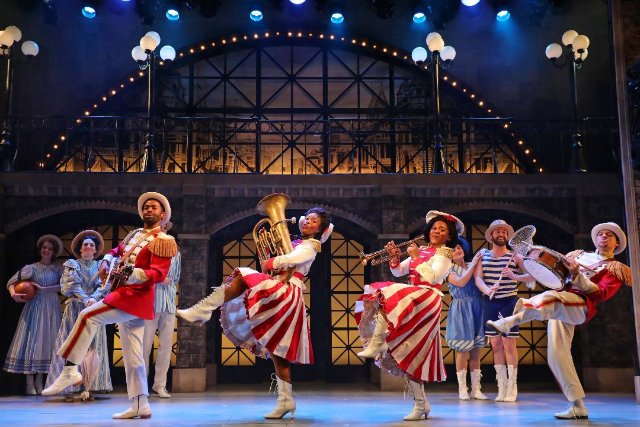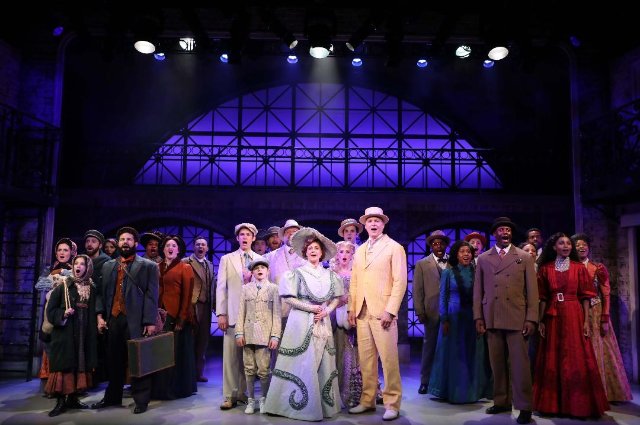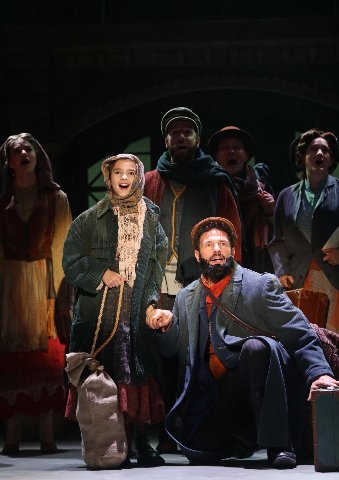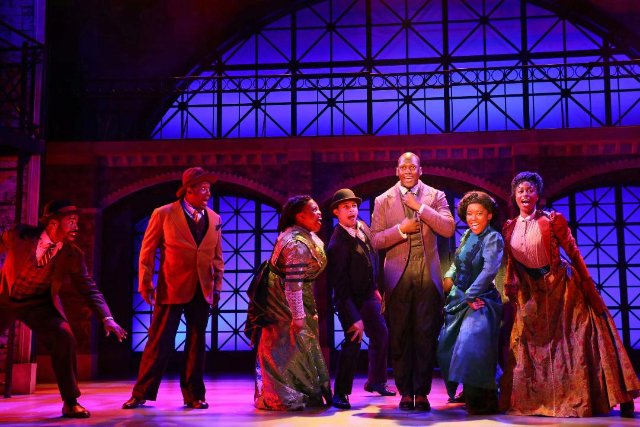Ragtime at Goodspeed
Not To Be Missed
By: Karen Isaacs - Jun 01, 2025
A touching story, characters you can root for, delightful music, and fine performances characterize Goodspeed’s production of Ragtime the Musical, now playing through Sunday, June 15. I have seen this show multiple times, from Broadway to very intimate venues, each time I am reminded what a terrific show it is.
The musical was adapted from E. L. Doctorow’s award-winning novel of the same title (1975), which also became a popular movie in 1981. The musical adaptation has a book by award-winning playwright Terrence McNally with music by Stephen Flaherty and lyrics by Lynn Ahrens.
Doctorow’s novel and the musical explore the changes occurring at the beginning of the 20th century in America, which were opposed by or frightened many. African Americans were heading north to the cities to escape the Jim Crow South, seeking the equality they had been promised; the Civil War had ended less than 40 years ago. Immigrants from southern and Eastern Europe landed on Ellis Island and other ports to escape grinding poverty, and in the case of many Eastern European Jews, religious prejudice. All the while, the white Protestant upper middle class smugly felt that everything should go on as before, though even drastic changes were hinted at as the suffragette movement was gaining power.
The novel explored the changes and repercussions coming to America. The musical, as did the novel, interweaves the stories of three main characters and their families to illustrate these changes while also incorporating into the story actual historic figures from Harry Houdini, the immigrant who became America’s most famous escape artists; Emma Goldman, the socialist firebrand, who rallied the immigrants to fight for fair wages and working conditions while attacking the wealthy; and Booker T. Washington, whose view of how African-Americans could earn equality would sound ridiculously naïve today, as well as Henry Ford, JP, Morgan, and other multimillionaires who felt their success indicated superiority
This musical, which opened in 1998, is unsettling. It was unsettling when it opened, and it remains unsettling every time I have seen it. It’s unsettling because it points out that America has not always lived up to its ideals, and in fact, at times has rejected them. The Statue of Liberty may say, “Give us your poor and huddled masses,” but in reality, immigrants have been stigmatized and taken advantage of as America has turned a blind eye to injustice and prejudice, whether based on color, race, religion, national origin, or gender.
Ragtime includes hauntingly beautiful music, and it has one of the greatest openings of any musical. We are introduced to each of the three groups, beginning with the affluent New Rochelle family, where we meet Mother, Father, Grandfather, Little Bou (son), and Mother‘s Brother. We never learn their given names. Next, we meet Coalhouse Walker, a ragtime pianist in Harlem, and his friends, including Sarah, his sweetheart. Lastly, the immigrants arrive in New York Harbor, looking for the streets paved in gold. Tateh holds tightly to his daughter; he has made the arduous journey from Latvia to give her a better life than he and his late wife had.
Director Christopher D. Betts manages a large cast effectively on the small Goodspeed stage.
He puts all of these elements on the stage as well as using the aisles at times without ever making it seem crowded.
The musical interweaves the stories of these three families, using music to convey their points of view.
It is easy to point to the outstanding features in this show — from the turn-of-the-century costumes by Stephanie Bahniuk, the flexible scenic design by Emmie Finckel, and the lighting design by Charlie Morrison. Special praise must be given the sound design by Jay Hilton and the music direction by Adam Souza. Choreographer Sarah Edwards blends in the popular dances of the period.
A strength of this production is the outstanding performances of the leading characters, Michael Wordly as Coalhouse Walker, Mami Parris as Mother, and David R Gordon as Tateh; each truly embodies the role and has the vocal chops to handle the music.
Equally fine is Brennyn Lark as Sarah, the young woman in love with Coalhouse, who, by giving birth to his son, starts Mother’s involvement in their story. Among the minor characters, I must point out how excellent Jonathan Cobrda is as Harry Houdini and Blair Goldberg as Emma Goldman.
This is a show that is filled with music from the beginning ragtime as the characters are introduced to Mother’s spectacular numbers “Goodbye, My Love,” “What Kind of Woman,” and “Back to Before” which points out that it is not just the immigrants and the African-Americans who are demanding change, women are also.
Coalhouse and Sarah express their dreams with “Wheels of a Dream,” “Make Them Hear You,” and “Sarah Brown Eyes,” a touching song.
If you look over the list of songs, you can almost realize the theme of the show from the beginning, “Goodbye My Love” and “Journey On,” to “New Music” and “Wheels of a Dream.” “Our Children,” “Back to Before,” and “Make Them Hear You.”
There are some fine ensemble numbers in this show, including “New Music” and “He Wanted to Say.”
Two of my favorite numbers are “The Night that Goldman Spoke at Union Square” and “The Crime of the Century.” In this production, the latter song was not as effectively directed as I thought it could be.
It is difficult to name everyone who did an excellent job, including Edward Watts as Father, Behr Marshall as Mother‘s Younger Brother, and Steven Tewksbury, who played both Grandfather and later Willie Conklin, the volunteer fire chief who is the impetus for much of the action. I’d give a special shoutout to Sawyer Delaney as Little Boy, who serves partly as a narrator.
You will leave Ragtime thinking about the wonderful melodies but also thinking about the message. It may be a cliché to say that it is thought-provoking and relevant today, but that is the truth. Contact Goodspeed.org for tickets.




